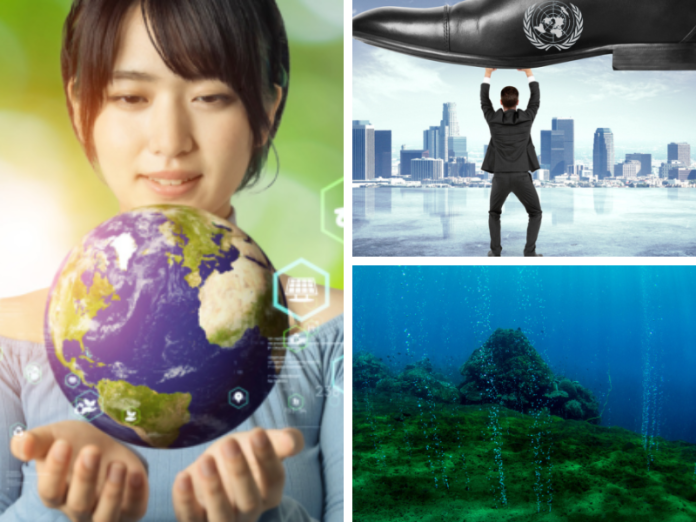YOU SHOULD SUBSCRIBE TO CLIMATE CHANGE WEEKLY.
IN THIS ISSUE:
- The Ugly Truth Is Out: Climate Scientists Want Power
- Podcast of the Week: Climate Change Rhetoric Becoming “More Militant”
- Asia-Pacific Companies Are Scaling Back Their Climate Ambitions
- Mounting Research Suggests Subsea Volcanic Activity Influences Climate
- Climate Comedy
- Video of the Week: Cold Spells and The Polar Vortex | Climate at a Glance
- Recommended Sites
Miss Anything at Heartland’s Climate Conference? No Problem.

The Ugly Truth Is Out: Climate Scientists Want Power
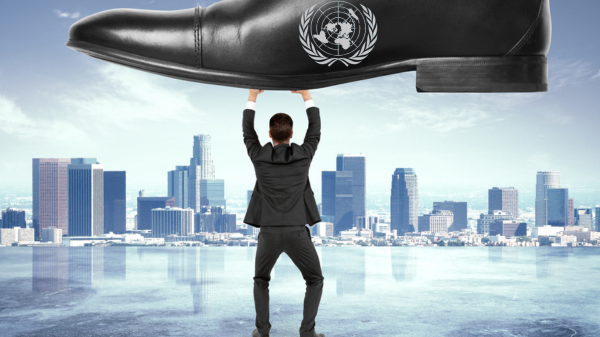
The Guardian reports U.N. climate scientists are finally saying the quiet part out loud: they want the authority to prescribe specific climate policies and the ability to track or monitor the compliance of the 195 nations that are signatories to the Paris climate agreement with those prescriptions or mandates. Per The Guardian:
Senior climate experts are calling for an overhaul of the structure and powers of the U.N.’s Intergovernmental Panel on Climate Change in despair at the slow pace of climate action.
Five lead authors of IPCC reports told the Guardian that scientists should be given the right to make policy prescriptions and, potentially, to oversee their implementation by the 195 states signed up to the UN framework convention on climate change (UNFCCC).
Sonia Seneviratne, an IPCC vice-chair and coordinating lead author since 2012, said: “At some point we need to say that if you want to achieve this aim set by policymakers then certain policies need to be implemented. …”
Scientists should be able to call for fossil fuel cuts and phaseouts, she said.
The honesty of these scientists is refreshing. In truth, the IPCC process has never been truly about preventing climate change, which is a process humans cannot control, but always about aggregating more power to bureaucrats and the governments that employ and empower them. This is not the first time U.N. spokespersons, and other would-be climate tyrants, honestly admitted that preventing climate change was a pretext for a government reset of the economy and governing systems. For example, in 2015, Christiana Figueres, then the executive secretary of U.N.’s Framework Convention on Climate Change, admitted that climate policies are not about saving the planet or the environment but about the power to remake society into a socialist paradise (as if there has been or ever could be such a thing).
“This is the first time in the history of mankind that we are setting ourselves the task of intentionally, within a defined period of time, to change the economic development model that has been reigning for at least 150 years, since the Industrial Revolution,” Figueres said.
Alexandria Ocasio-Cortez’s (D-NY) chief of staff, Saikat Chakrabarti, admitted the same thing concerning her Green New Deal, saying, “[t]he interesting thing about the Green New Deal is it wasn’t originally a climate thing at all. We really think of it as a how-do-you-change-the-entire-economy thing.”
And, in February 2021, Massachusetts Undersecretary for Climate Change David Ismay said at a climate conference in Vermont that in the Northeast there were no more big climate “offenders” to break, now it was time to “break” the people.
In the end, authoritarians will always try to cloak their ambitions in paternalistic terms—“we must do this for the good of, ‘the people,’ ‘the proletariat,’ ‘the volk,’ ‘society,’ ‘the planet.’” Pick your term from the appropriate region and time period, but it is in reality all about increasing their own power and aggrandizing themselves, necessarily at the expense of average people.
The truth should be an absolute defense against climate authoritarians’ ambitions. In particular, the truth spoken by Sultan Ahmed Al Jaber, head of Dubai’s state oil and renewable energy companies and the host of COP 28. During a presentation prior to the conference, he stated:
There is no science out there, or no scenario out there, that says the phase-out of fossil fuel is what’s going to achieve 1.5. You are asking for a phase out of fossil fuels, please help me, show me, the roadmap for a phase out of fossil fuels that will allow … for sustainable socio-economic development. Unless you want to take the world back into caves.
Al Jaber’s assessment is a sober and accurate description of reality. Thankfully, as detailed at Climate at a Glance and Climate Realism, there is no need for a premature phase out or shutdown of fossil fuels. Extreme weather is not worsening and deaths from weather events have declined by more than 98 percent. In addition, as the Earth has modestly warmed crop production and yields have dramatically increased with a corresponding decline in hunger and starvation, and deaths attributable to non-optimum temperatures have substantially fallen.
There is absolutely no demonstrated need to eschew the benefits of modern society that fossil fuel use makes possible. Also, there is certainly no justification for giving up essential liberty or economic progress to climate czars in a vain effort to control future weather.
In his farewell address, President Dwight D. Eisenhower warned that with the advent of big government funding big science, the people should jealously guard their liberty.
“[H]olding scientific discovery in respect, as we should, we must also be alert to the equal and opposite danger that public policy could itself become the captive of a scientific-technological elite,” Eisenhower said.
His prescient and wise counsel is truer today than ever before.
Sources: The Guardian; Townhall
Get your Copy at Amazon TODAY!
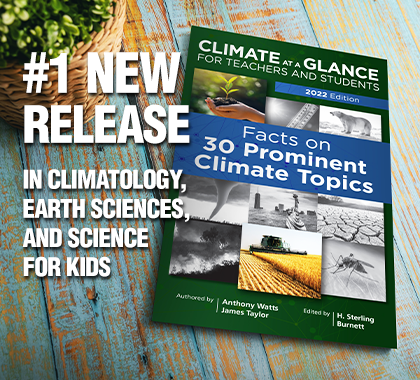
Podcast of the Week
The COP28 Climate Summit begins its second week of events and there is a lot to talk about. UAE Sultan Al Jaber has stirred up a hornets nest by questioning the climate cult, Climate Czar John Kerry admits to becoming “more militant,” and Al Gore is becoming increasingly unhinged. Is this climate narrative coming unglued? Or are we beginning to see an even more authoritarian push for climate action?
Subscribe to the Environment & Climate News podcast on Apple Podcasts, iHeart, Spotify or wherever you get your podcasts. And be sure to leave a positive review!
Asia-Pacific Companies Are Scaling Back Their Climate Ambitions

A report produced by EY Consulting (Ernst & Young) about sustainability efforts undertaken by business around the world found that businesses, especially in the Asia-Pacific region, were scaling back their climate commitments due to an increasing recognition of the high costs entailed by actions aimed at preventing global warming.
As a baseline, the EY report accepts the belief that achieving net zero is necessary to meet the Paris climate goal of limiting post-industrial global average temperature to a rise of no more than 1.5 ℃.
“The 2023 Sustainable Value Study shows that in Asia-Pacific, progress is slowing at a crucial time, and that gains are becoming harder to make,” EY wrote in a statement accompanying the release of its report.
The study consisted of a survey “conducted between August and October with 520 chief sustainability officer-level managers at international firms with at least US$1 billion in annual revenue across 10 industries in 23 nations.”
Among all businesses surveyed globally, the median target year for reaching net zero carbon dioxide emissions has retreated from 2036 in an earlier survey, to 2050 now. The delayed target was especially pronounced among businesses in the Asian-Pacific region, which made up approximately one-third of the companies surveyed. In particular, according to a South China Morning Post (SCMP) story on the EY report:
- Companies in Asia are twice as likely as their global peers to say the cost of achieving climate commitments is too high.
- Sixty-five percent of firms in the Asia-Pacific region, in countries such as China, Japan, and Australia, will spend the same or less on addressing climate change over the next 12 months, compared with the previous year, the survey found.
- A fifth of the corporate sustainability leaders in the Asia-Pacific region said the financial cost of achieving their companies’ climate change commitments is too high, which has led them to push back their targets—twice the number of companies saying the same thing based in the Americas, Europe, the Middle East, India, and Africa.
- Only 15 per cent of the Asia-Pacific respondents said their firms are committed to achieving their climate change ambitions by 2030 or earlier, while another 19 percent said their goals will be for 2060 or later. The rest set their targets between 2030 and 2060.
Terence Jeyaretnam, EY Asia-Pacific climate change and sustainability services leader, suggests some explanations for why companies are scaling back ambitious timelines for net zero now, even as the pressure to adopt quick timelines and stricter limits are being pushed by the United Nations.
“There are likely many factors behind this delay, including the fact that the more work companies have done to meet targets, the more it has become clear that attaining goals will take time, in particular the time restraint imposed by rolling out renewable [energy projects] and abating emissions,” Jeyaretnam told the SCMP. “Sometimes the initial net zero commitments were made by a sustainability leader, or even a CEO, who didn’t always have an assessment of the necessary commercial elements.”
Source: South China Morning Post
Heartland’s Must-read Climate Sites



Mounting Research Suggests Subsea Volcanic Activity Influences Climate
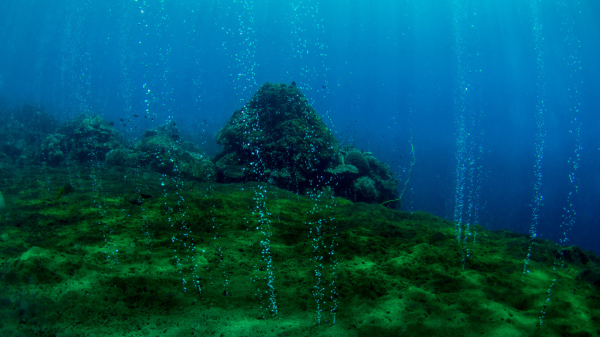
Research from Wyss Yim, Ph.D., of The University of Hong Kong, retired, suggests that subsea volcanic activity affects ocean currents and temperatures, an influence not accounted for by the U.N. Intergovernmental Panel on Climate Change and climate models.
In a series of presentations and papers, Yim says that subsurface marine volcanoes create ocean surface warming that is confused with either El Niños or ocean warming wrongly attributed to human carbon dioxide emissions.
Yim’s research suggests that far too much of the present warming is attributed to human greenhouse gas emissions relative to natural forcing factors, such as solar variability and the interaction of Earth systems (atmosphere, hydrosphere, biosphere, cryosphere, pedosphere—the soil mantel of Earth, and lithosphere, including volcanism).
Yim ranks the order of importance for causing climate change as:
-
- Astronomical forcing (glacial cycles, and regional changes such as monsoons and daily
changes)
-
- Geothermal heat/plate climatology
- Human-induced changes, including heat generation, water cycle changes, and greenhouse gases.
Yim divides volcanic activity that influences climate into three types:
-
- Sub-aerial/terrestrial
- Submarine/sea floor
- Mixed
Concerning submarine volcanic eruptions, Yim says they can create “heat blobs” in the oceans and cause pressure changes, surface wind changes, and sea-level changes—due to thermal expansion, ocean current changes, and polar sea-ice changes. These localized temperature blobs, when measured by various instruments, are often attributed wrongly to human-caused climate change, such as when a submarine volcano off El Hierro produced basaltic lavas at about 1,200 °C. This caused a small section of the Atlantic to boil. Al Gore blamed the boiling on human climate change.
The geothermal heat released during eruptions can alter usual oceanic and/or atmospheric circulation, causing downstream ecological effects. Yim cites a number of specific eruptions that have affected climate regionally. For example, he says that “contributors to the long and strong 2014-2016 ENSO include the Nishino-shima eruption from March 2013-August 2015, the Hunga eruption from December 2014-January 2015, the Axial Seamount eruption from April to May 2015 and the Wolf eruption from May to June 2015. This is also supported by Arctic sea-ice changes.”
Yim’s point isn’t that volcanic activity is the main driver of climate change, but rather that it is a significant factor that isn’t being accounted for by the scientists pushing the doomsday anthropogenic-climate-change narrative.
“Climatic models must take into account the influence of volcanic eruptions on atmospheric and oceanic circulation,” said Yim. “The role of submarine volcanism in regional oceanic warming is greatly underestimated … our dynamic Earth must be understood.”
Sources: Research Gate; Science and Environmental Policy Project; Youtube
Video of the Week
In the first of a new series based on The Heartland Institute’s Climate at a Glance for Teachers and Students, research fellow Linnea Lueken presents the facts about cold spells, the polar vortex, and their connection (or lack thereof) to global warming.
Climate Comedy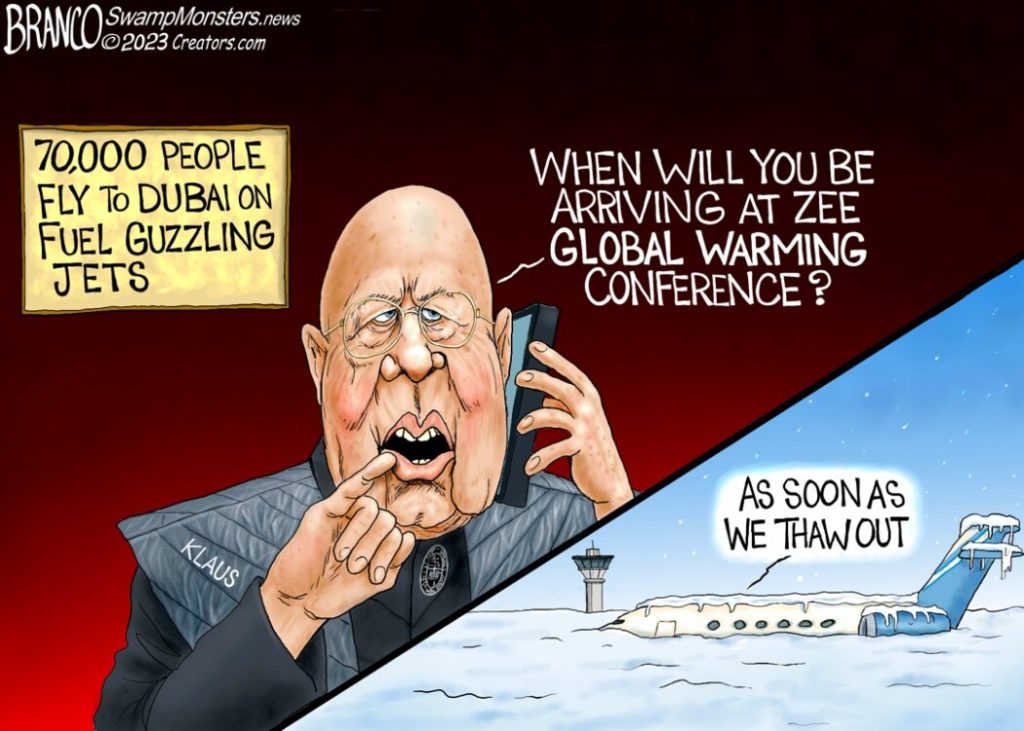
via Cartoons by Josh


